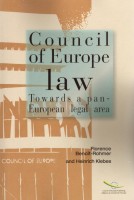This report describes all the work carried out in 2004 by the Council of Europe's bodies and in its various areas of activity.Following Monaco's accession on 5 October, the Council of Europe has forty-six member states. It has virtually completed its enlargement - only Belarus is still not a member, due to its lack of respect for human rights and democratic principles.From the Rose Revolution in Georgia to the Orange Revolution in Ukraine, from the ethnic violence in Kosovo in March to the various conflicts that were more or less deadlocked on the borders of several member states, a number of major developments prompted the Council of Europe to intervene and take action in 2004. A few months after the terrorist attack in Madrid, the Beslan tragedy strengthened the Organisation's determination to combat terrorism, a responsibility that is now assigned to a specialist Committee, the Codexter.Preparations for the 3rd Summit of Heads of State and Government, scheduled to take place in Warsaw on 16 and 17 May
2005, occupied an important place in the Organisations's work in 2004. The Summit should update the tasks assigned to the Council in a unified Europe and consolidate its role among the European institutions, which are undergoing sweeping changes, particularly in the wake of European Union enlargement.A new secretary General, Mr Terry Davis, was elected by the Parliamentary Assembly of the Council of Europe in 2004. He took office on 1 September for a period of five years.






